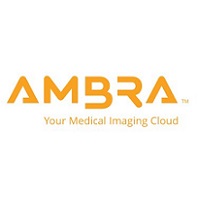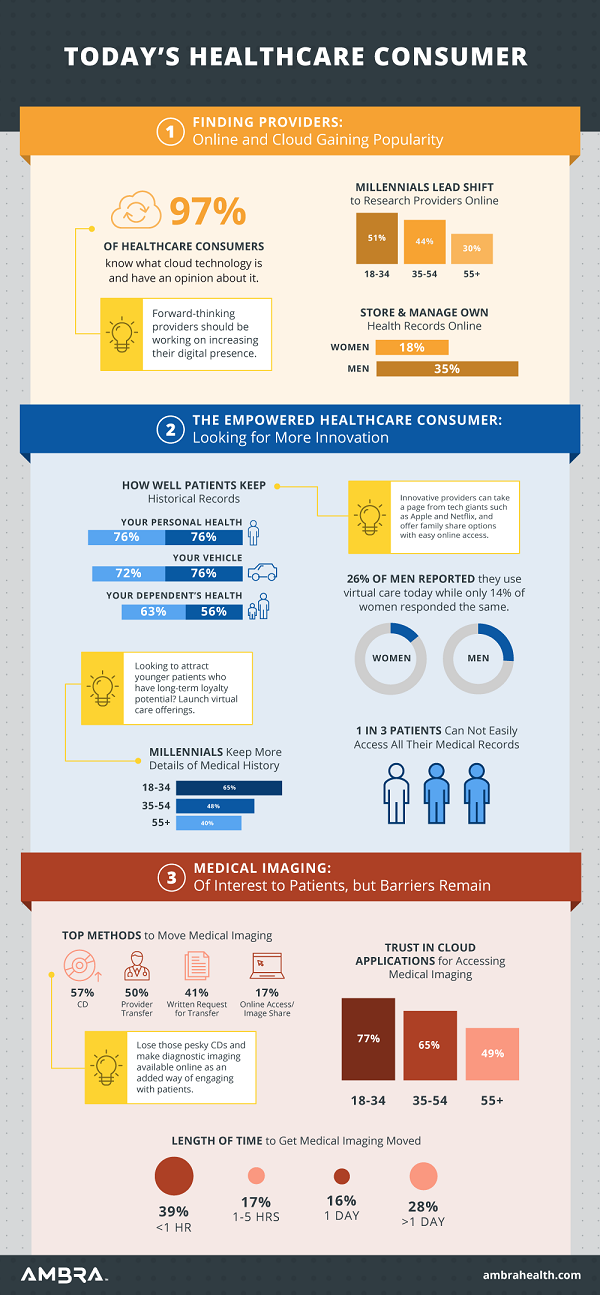 Ambra Health report shows patients are making decisions based on how well healthcare providers use technology to meet their need for convenient services
Ambra Health report shows patients are making decisions based on how well healthcare providers use technology to meet their need for convenient services
Healthcare consumers are familiar with and trust cloud technology, yet nearly one in three still can not easily access their medical records, according to a report released from Ambra Health (@ambrahealth), “Era of Change: Today’s Healthcare Consumer”. The survey of over 1,100 healthcare consumers found that a whopping 97% across all age and gender demographics are familiar with cloud technology, yet 31% can not easily access their medical records and only half of those can access medical records online via their healthcare provider. When it comes to moving diagnostic data like xray, CT and MRI from one provider to another, 57% still use CDs, and it takes 44% of patients a day or more to move these medical images. These findings show a clear gap in the expectations of today’s empowered patient versus the services being offered by healthcare providers.
The wide-ranging report offers new insight on how healthcare consumers are using technology to manage their health. Particularly interesting was the adoption of emerging services such as online scheduling, virtual care and medical image sharing which showed some division by gender, as well as age group.
“We’re entering the age of empowered healthcare consumers taking a more active role in managing their health through technology,” said Morris Panner, CEO of Ambra Health. “A key differentiator for healthcare providers will be their ability to offer modern, convenient services that patients are accustomed to from other consumer applications.”
Finding Providers: Online & Cloud Gaining Popularity
Patients are not holding back healthcare’s move to the cloud with 77% of respondents trusting cloud technology, or not concerned by it. The younger the patient, the more likely they are to trust the cloud, with an approximately 30 point swing in millennials (74%) vs. boomers (44%). Interestingly, a gender gap emerged here with men trusting the cloud more than women (66% vs. 52%), although both had low levels of distrust.
Referrals are still the primary way for patients to find a provider with 72% indicating this as a top choice over their health insurance network, word of mouth or online research. Less than a decade ago, online search was rarely used for finding healthcare providers, but today 42% of respondents now conduct research online when selecting a provider. Two-thirds, regardless of age and gender, said that online scheduling is key to patient engagement. The younger the patient is, the more relevant this becomes with 80% of millennials citing ease of medical record access and scheduling as a key consideration, while only 52% of boomers cite this as important.
Empowered Healthcare Consumers Are Looking for More Innovation
Healthcare consumers have made the shift to online— but they are still looking for more from their providers as 31% can not easily access their medical records. Of those that can, only 50% stated they do this through online access offered by their provider. Compared to record keeping of other important items, 74% of today’s healthcare consumers reported keeping good or very good records on their vehicle vs. only 62% on the health of their dependents. This gap widens by gender with 76% of men doing well when it comes to record keeping on their vehicles vs. only 56% doing the same for their dependent health records.
An overwhelming 73% of healthcare consumers indicated they would like all their medical data to be accessible via a standard website or mobile device. This includes easy online access to diagnostic data such as xray, CT, ultrasound and echo medical imaging, which is often omitted today from online patient portals. And when it comes to virtual care adoption, there is a significant age gap as 34% of 18-34 year olds reported receiving virtual care today but only 3% among those aged 55+. By gender, men reported receiving virtual care more than women at 26% and 14% respectively.
Medical Imaging: Of Interest To Patients, But Barriers Remain
Radiology has not traditionally engaged directly with patients, but 80% of respondents said they would like to have access to their medical imaging alongside their test results, implying the need for increased annotation and patient facing reports that can be easily understood. And while there is significant discussion in the healthcare community about “data liquidity” and the benefits of freely moving diagnostic data such as medical imaging to drive referrals, second opinion programs, or telehealth initiatives, survey respondents reported that moving this data is still CD-centric and manual with only 17% being able to easily access or share medical imaging online.
The full report is available to download. Healthcare providers are invited to join a free webinar on Thursday, September 28 at 2pm Eastern to explore actionable insights based on the study findings.
Methodology
The survey was conducted online by Toluna Group in the second quarter of 2017 on behalf of Ambra Health among 1,136 U.S. respondents over the age of 18 who have received medical imaging services. Complete survey methodology available upon request.
About Ambra Health
Ambra Health is a medical data and image management SaaS company. Intuitive, flexible, scalable and highly interoperable, the Ambra cloud platform is designed to serve as the backbone of imaging innovation and progress for healthcare providers. It empowers some of the largest health systems such as Memorial Hermann, Stanford Children’s Health and New England Baptist Hospital as well as radiology practices, subspecialty practices and clinical research organizations to dramatically improve imaging and collaborative care workflows. As expert partners, we listen to our customers, understand their needs, and apply our extensive knowledge to deliver innovative medical image management solutions for the future of healthcare, now. Discover what the Ambra medical imaging cloud can do for you.

